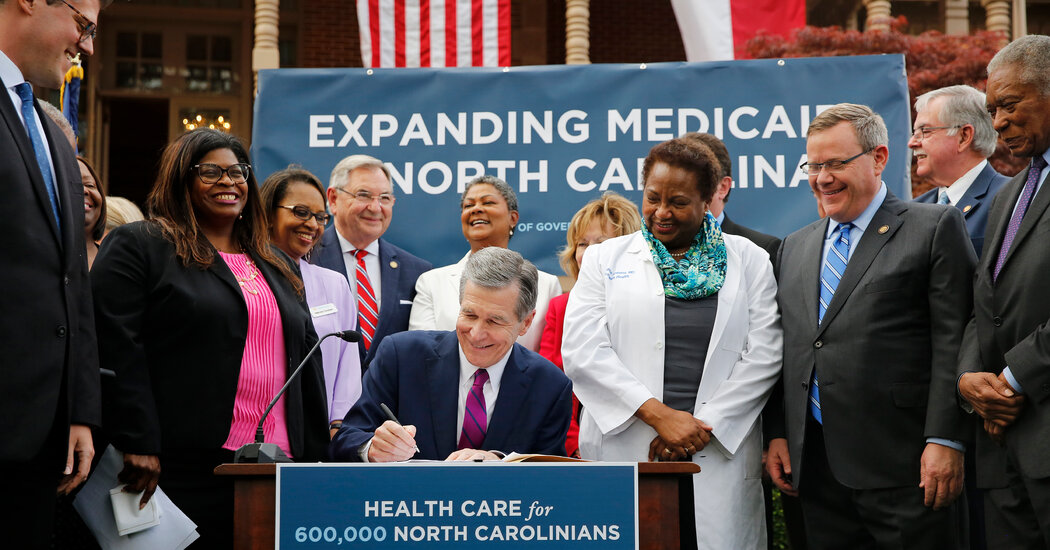
RALEIGH, N.C. — North Carolina on Monday became the 40th state to expand Medicaid under the Affordable Care Act, the latest sign of how Republican opposition to the health measure has weakened more than a decade after President Barack Obama signed it into law.
Gov. Roy Cooper, a Democrat, signed legislation expanding the state’s Medicaid program during a sunny afternoon ceremony on the lawn of the Executive Mansion, days after the Republican-controlled legislature gave final approval to the measure. He was surrounded by patients, advocates and some of the same Republican leaders who had previously blocked expansion in the state.
The bill will expand Medicaid to adults who make up to 138 percent of the federal poverty level, or about $41,000 for a family of four. State officials say the expansion will cover an estimated 600,000 people. It will take effect when the state adopts a budget, likely by June, Mr. Cooper said in an interview before the signing ceremony.
“Today is a historic step toward a healthier North Carolina,” the governor declared before signing the measure. When a reporter pressed him on when the expansion would take effect, he said, “It’s only a question of when, not if.”
It has been nearly 11 years since the Supreme Court ruled that states did not have to expand Medicaid — the government health insurance program for low-income people — under the Affordable Care Act. Nearly half the states opted out. More recently, progressives have helped to expand Medicaid in seven states — all of them with either Republican-controlled or divided governments — by putting the question directly to voters; in November, South Dakota adopted Medicaid expansion via the ballot box.
Health Care in the United States
But getting Republican elected officials to abandon their opposition to expanding the program has not been easy. The last state where a Republican-controlled legislature voted to expand Medicaid was Virginia, in 2018. The governor at the time was a Democrat, Ralph Northam.
The battle over Medicaid has been particularly intense in North Carolina. Supporters of expansion conducted hundreds of “Moral Mondays” protests at the State Capitol. In 2014, the Republican mayor of a town that lost its hospital walked all the way to Washington to build support for expansion.
Monday’s bill signing leaves just 10 states — all with divided or Republican leadership, and most of them in the South — that have yet to expand Medicaid. Advocates say they now have their sights set on Alabama, where Gov. Kay Ivey, a Republican, can expand her state’s program with her own authority.
In North Carolina, there are various reasons for Republicans’ recent change of heart. Much of the opposition in the state and elsewhere has been both ideological and partisan — a reflection of Republicans’ deep distaste for Mr. Obama. But it is now clear that the Affordable Care Act, known as Obamacare, is here to stay. Republicans in Washington have been unable to repeal the law and appear to have largely given up fighting it, helping to pave the way for expansion in North Carolina.
“The argument that this is somehow an endorsement of Obamacare is losing a lot of political currency, even among conservatives,” said Frederick Isasi, the executive director of Families USA, a health care advocacy group based in Washington.
Hospitals, especially struggling rural ones, are eager for the extra revenue that Medicaid reimbursement will bring. The federal government picks up 90 percent of the costs of reimbursement under the expansion, and in North Carolina, hospitals will pay the other 10 percent. The state has revamped its Medicaid program, moving it from a fee-for-service program to one that relies on managed care — a long-sought goal of Republicans.
“This has been a long day coming, but it’s been as a result of a lot of reforms,” Tim Moore, the speaker of the state’s House of Representatives and a Republican, said during the signing ceremony. The changes, he said, “allowed us to be in the position that we’re in today to be able to expand this coverage.”
For Mr. Cooper, who is in his second term and has been mentioned as a possible future Democratic candidate for Senate or even president, the bill signing was a significant victory. He sought to expand Medicaid when he first took office in 2017, and Republicans sued in federal court to stop him from doing it.
The push for expansion picked up steam last year, when the state’s House and Senate approved separate measures. But the two chambers were unable to reconcile differences.
The signing ceremony on Monday was at turns poignant and celebratory. Cassandra Brooks, who operates Little Believer’s Academy, a day care center in the Raleigh area, choked back tears as she recalled two of her teachers who had died, she said, because they could not afford health care.
“They were excellent early childhood teachers who didn’t have health insurance and passed away due to preventable health conditions,” she said. She cast the expansion measure as a boon to small businesses that operate on thin margins and cannot afford to offer their employees coverage.
“Here’s to Medicaid expansion in North Carolina,” she said. “Here’s to supporting small business in North Carolina. Here’s to continued growth in North Carolina. I believe in North Carolina.”
